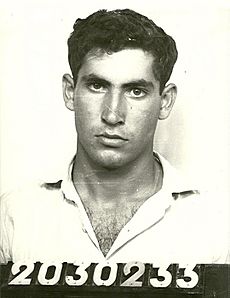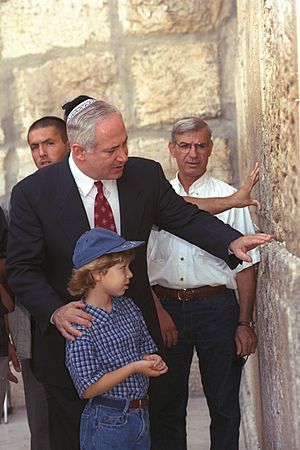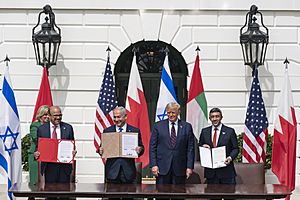Benjamin Netanyahu facts for kids
Quick facts for kids
Benjamin Netanyahu
|
|
|---|---|
|
בִּנְיָמִין נְתַנְיָהוּ
|
|
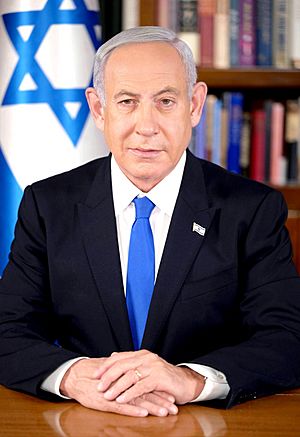
Official portrait, 2023
|
|
| 9th Prime Minister of Israel | |
| Assumed office 29 December 2022 |
|
| President | Isaac Herzog |
| Preceded by | Yair Lapid |
| In office 31 March 2009 – 13 June 2021 |
|
| President | |
| Alternate | Benny Gantz (2020–21) |
| Preceded by | Ehud Olmert |
| Succeeded by | Naftali Bennett |
| In office 18 June 1996 – 6 July 1999 |
|
| President | Ezer Weizman |
| Preceded by | Shimon Peres |
| Succeeded by | Ehud Barak |
| Leader of the Opposition | |
| In office 28 June 2021 – 29 December 2022 |
|
| Prime Minister |
|
| Preceded by | Yair Lapid |
| Succeeded by | Yair Lapid |
| In office 16 January 2006 – 31 March 2009 |
|
| Prime Minister | Ehud Olmert |
| Preceded by | Amir Peretz |
| Succeeded by | Tzipi Livni |
| In office 3 February 1993 – 18 June 1996 |
|
| Prime Minister |
|
| Preceded by | Yitzhak Shamir |
| Succeeded by | Shimon Peres |
| Chairman of Likud | |
| Assumed office 20 December 2005 |
|
| Preceded by | Ariel Sharon |
| In office 3 February 1993 – 6 July 1999 |
|
| Preceded by | Yitzhak Shamir |
| Succeeded by | Ariel Sharon |
| 7th Permanent Representative of Israel to the United Nations | |
| In office 1 September 1984 – 1 March 1988 |
|
| Prime Minister |
|
| Preceded by | Yehuda Blum |
| Succeeded by | Yohanan Bein |
| Ministerial roles | |
| 1996–1997 | Science and Technology |
| 1996–1999 | Housing and Construction |
| 2002–2003 | Foreign Affairs |
| 2003–2005 | Finance |
| 2009–2013 |
|
| 2012–2013 | Foreign Affairs |
| 2013 |
|
| Personal details | |
| Born | 21 October 1949 Tel Aviv, Israel |
| Political party | Likud |
| Spouses |
Miriam Weizmann
(m. 1972; div. 1978)Fleur Cates
(m. 1981; div. 1988)Sara Ben-Artzi
(m. 1991) |
| Children | 3, including Yair |
| Parent |
|
| Relatives |
|
| Alma mater | |
| Occupation |
|
| Cabinet |
|
| Signature |  |
| Nickname | Bibi |
| Military service | |
| Branch/service | Israel Defense Forces |
| Years of service | 1967–1973 |
| Rank | Séren (Captain) |
| Unit | Sayeret Matkal |
| Battles/wars | |
Benjamin "Bibi" Netanyahu ( NET-ən-YAH-hoo; Hebrew: בִּנְיָמִין נְתַנְיָהוּ, romanized: Binyāmīn Nētanyāhū born 21 October 1949) is an Israeli politician who has been serving as the prime minister of Israel since 2022, having previously held the office from 1996 to 1999 and again from 2009 to 2021. He is the chairman of the Likud party. Netanyahu is the longest-serving prime minister in the country's history, having served for a total of over 16 years. He is also the first prime minister to have been born in Israel after its establishment.
Contents
Early life and military career
Netanyahu was born in 1949 in Tel Aviv. His mother, Tzila Segal (1912–2000), was born in Petah Tikva in the Ottoman Empire's Mutasarrifate of Jerusalem, and his father, Warsaw-born Benzion Netanyahu (né Mileikowsky; 1910–2012), was a historian specializing in the Jewish Golden age of Spain.
Netanyahu was the second of three children. He was initially raised and educated in Jerusalem, where he attended Henrietta Szold Elementary School.
Between 1956 and 1958, and again from 1963 to 1967, his family lived in the United States in Cheltenham Township, Pennsylvania, a suburb of Philadelphia, while father Benzion Netanyahu taught at Dropsie College. Benjamin attended and graduated from Cheltenham High School and was active in the debate club, chess club, and soccer.
After graduating from high school in 1967, Netanyahu returned to Israel to enlist in the Israel Defense Forces. He trained as a combat soldier and served for five years in a special forces unit of the IDF, Sayeret Matkal. He took part in numerous cross-border assault raids during the 1967–70 War of Attrition, rising to become a team-leader in the unit. He was wounded in combat on multiple occasions. He was involved in many other missions. He was discharged from active service in 1972 but remained in the Sayeret Matkal reserves. Following his discharge, he left to study in the United States but returned in October 1973 to serve in the Yom Kippur War.
Education
Netanyahu returned to the United States in late 1972 to study architecture at the Massachusetts Institute of Technology (MIT). He completed a bachelor's degree in architecture in February 1975 and earned a master's degree from the MIT Sloan School of Management in June 1976.
At MIT, Netanyahu studied a double-load while simultaneously taking courses at Harvard University, completing a master's degree (that would normally take four years) in only two and a half years, despite taking a break to fight in the Yom Kippur War.
At that time he changed his name to Benjamin "Ben" Nitai (Nitai, a reference to both Mount Nitai and to the eponymous Jewish sage Nittai of Arbela, was a pen name often used by his father for articles). Years later, in an interview with the media, Netanyahu clarified that he decided to do so to make it easier for Americans to pronounce his name. This fact has been used by his political rivals to accuse him indirectly of a lack of Israeli national identity and loyalty.
In 1976, Netanyahu graduated near the top of his class at the MIT Sloan School of Management.
Career
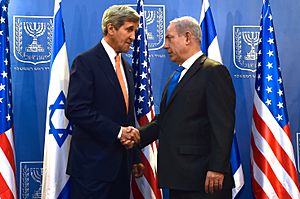
Netanyahu was headhunted to be an economic consultant for the Boston Consulting Group in Boston, Massachusetts, working at the company between 1976 and 1978.
In 1978, Netanyahu returned to Israel. Between 1978 and 1980, he ran the Jonathan Netanyahu Anti-Terror Institute, a non-governmental organization devoted to the study of terrorism; the Institute held a number of international conferences focused on the discussion of international terrorism. From 1980 to 1982, he was director of marketing for Rim Industries in Jerusalem.
He was appointed Deputy Chief of Mission at the Israeli Embassy in Washington, D.C., a position he held from 1982 until 1984. During the 1982 Lebanon War, he was called up for reserve duty in Sayeret Matkal and requested to be released from service, preferring to remain in the US and serve as a spokesperson for Israel in the wake of harsh international criticism of the war. Between 1984 and 1988, Netanyahu served as the Israeli ambassador to the United Nations.
Netanyahu rose to prominence after being elected as the chairman of Likud in 1993, becoming Leader of the Opposition. In the 1996 election, Netanyahu beat Shimon Peres, becoming the first Israeli prime minister elected directly by popular vote, and its youngest-ever. Netanyahu and Likud were heavily defeated in the 1999 election by Ehud Barak's One Israel party; and Netanyahu chose to retire from politics entirely, entering the private sector. Netanyahu later returned to politics, and served as Minister of Foreign Affairs and Minister of Finance under Ariel Sharon. During the latter position, he initiated reforms of the Israeli economy that led to significant growth, before ultimately resigning over disagreements regarding the Gaza disengagement plan.
Netanyahu returned to the leadership of Likud in December 2005 after Sharon stepped down to form a new party, Kadima. He was the Leader of the Opposition from 2006 to 2009. After the 2009 election, Netanyahu formed a coalition government with other right-wing parties and was sworn in as prime minister for a second time. He went on to lead Likud to victory in the 2013 and 2015 elections. A period of political deadlock ensued after three consecutive elections in 2019 and 2020 failed to produce a government, which was solved after a coalition rotation agreement was reached between Netanyahu and centrist Blue and White alliance's Benny Gantz. The coalition collapsed In December 2020, before the rotation could take place, and a new election was held in March 2021. In his penultimate government, Netanyahu led Israel's response to the COVID-19 pandemic and the 2021 Israel–Palestine crisis. In June 2021, after Naftali Bennett formed a government with Yair Lapid, Netanyahu was removed from the premiership, becoming opposition leader for the third time, before returning as Prime Minister again after the 2022 election.
Netanyahu has faced international criticism over his decades-long policy as prime minister of expanding Israeli settlements in the occupied West Bank, deemed illegal under international law.
Political positions
Economic views
Netanyahu has been described as "the advocate of the free-market". As prime minister in his first term, he significantly reformed the banking sector, removing barriers to investment abroad, mandatory purchases of government securities and direct credit. As Minister of Finance (2003–2005), Netanyahu introduced a major overhaul of the Israeli economy. He introduced a welfare to work program, he led a program of privatization, reduced the size of the public sector, reformed and streamlined the taxation system and passed laws against monopolies and cartels with the aim of increasing competition. Netanyahu extended capital gains taxes from companies to individuals, which allowed him to enlarge the tax base while reducing taxes on incomes. As the Israeli economy started booming and unemployment fell significantly, Netanyahu was widely credited by commentators as having performed an 'economic miracle' by the end of his tenure. Direct investment in the Israeli economy had increased by an annualized 380%. On the other hand, his critics have labelled his economic views as Margaret Thatcher-inspired "popular capitalism".
Views on counter-terrorism
In addition to having taken part in counter-terrorist operations during his service in the military, Netanyahu has published three books on the subject of fighting terrorism. He identifies terrorism as a form of totalitarianism.
He advises tighter immigration laws as an essential tool to combat terrorism.
In particular, Ronald Reagan was an admirer of Netanyahu's work on counter-terrorism, and Reagan recommended Netanyahu's book Terrorism: How the West Can Win to all senior figures in his administration.
Peace process
Netanyahu opposed the Oslo accords from their inception. During his term as prime minister in the late 1990s, Netanyahu consistently reneged on commitments made by previous Israeli governments as part of the Oslo peace process, leading American peace envoy Dennis Ross to note that "neither President Clinton nor Secretary [of State Madeleine] Albright believed that Bibi had any real interest in pursuing peace."
On 9 August 2009, Netanyahu said, "We want an agreement with two factors, the first of which is the recognition of Israel as the national state of the Jewish people and [the second is] a security settlement. In the case of Gaza, both of these factors were lacking". He also said, "Should we achieve a turn toward peace with the more moderate partners, we will insist on the recognition of the State of Israel and the demilitarization of the future Palestinian state".
He repeatedly made public statements which advocated an "economic peace" approach, meaning an approach based on economic cooperation and joint effort rather than continuous contention over political and diplomatic issues. This is in line with many significant ideas from the Peace Valley plan. He raised these ideas during discussions with former U.S. Secretary of State Condoleezza Rice.
In January 2009, prior to the February 2009 Israeli elections Netanyahu informed Middle East envoy Tony Blair that he would continue the policy of the Israeli governments of Ariel Sharon and Ehud Olmert by expanding settlements in the West Bank, in contravention of the Road Map, but not building new ones.
In 2013, Netanyahu denied reports that his government would agree to peace talks on the basis of the green line. In 2014 he agreed to the American framework based on the green line and said that Jewish settlers must be allowed the option of staying in their settlements under Palestinian rule.
In January 2020, Netanyahu publicly supported Trump's Israeli-Palestinian peace plan.
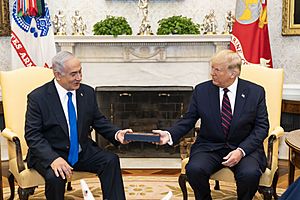
The U.S.-brokered Abraham Accords agreed to the full normalization of relations between Israel and the United Arab Emirates (the Israel–United Arab Emirates normalization agreement) and Bahrain, respectively (the Bahrain–Israel normalization agreement). This was the first time any Arab country had normalized relations with Israel since Jordan in 1994. The accords were signed by Bahrain's foreign minister, UAE's foreign minister and Netanyahu on 15 September 2020 at the South Lawn of the White House in Washington, D.C.
On 23 October 2020, U.S. President Donald Trump announced that Sudan will start to normalize ties with Israel, making it the third Arab state to do so as part of the Trump administration-brokered Abraham Accords. Sudan fought in wars against Israel in 1948 and 1967. Netanyahu thanked "President Trump and his team above all", saying that "together with him we are changing history ... despite all the experts and commentators who said it was impossible. Israel was completely isolated and they told us we were heading into a political tsunami. What's happening is the absolute opposite." This was followed by Morocco establishing relations with Israel in December.
Bar-Ilan speech
On 14 June 2009, Netanyahu delivered a seminal address at Bar-Ilan University (also known as the "Bar-Ilan speech"), at Begin-Sadat Center for Strategic Studies, that was broadcast live in Israel and across parts of the Arab world, on the topic of the Israeli–Palestinian peace process. He endorsed for the first time the notion of a Palestinian state alongside Israel. Netanyahu's speech could be viewed in part as a response to Obama's 4 June speech at Cairo. Yedioth Ahronoth claimed that Obama's words had "resonated through Jerusalem's corridors".
As part of his proposal, Netanyahu demanded the full demilitarization of the proposed state, with no army, rockets, missiles, or control of its airspace, and said that Jerusalem would be undivided Israeli territory. He stated that the Palestinians should recognize Israel as the Jewish national state with an undivided Jerusalem. He rejected a right of return for Palestinian refugees, saying, "any demand for resettling Palestinian refugees within Israel undermines Israel's continued existence as the state of the Jewish people." He also stated that a complete stop to settlement building in the West Bank, as required by the 2003 Road Map peace proposal, was not possible and the expansions will be limited based on the "natural growth" of the population, including immigration, with no new territories taken in. Nevertheless, Netanyahu affirmed that he accepted the Road Map proposal. He did not discuss whether or not the settlements should be part of Israel after peace negotiations, simply stating that the "question will be discussed".
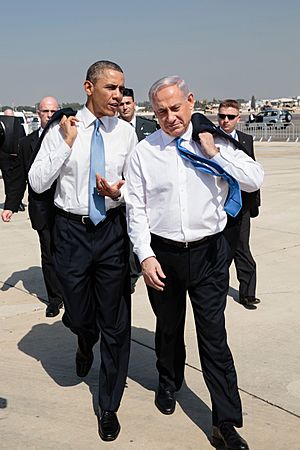
In a response to U.S. President Barack Obama's statements in his Cairo speech, Netanyahu remarked, "there are those who say that if the Holocaust had not occurred, the State of Israel would never have been established. But I say that if the State of Israel would have been established earlier, the Holocaust would not have occurred." He also said, "this is the homeland of the Jewish people, this is where our identity was forged." He stated that he would be willing to meet with any "Arab leader" for negotiations without preconditions, specifically mentioning Syria, Saudi Arabia, and Lebanon. In general, the address represented a new position for Netanyahu's government on the peace process.
Some right-wing members of Netanyahu's governing coalition criticized his remarks for the creation of a Palestinian State, believing that all of the land should come under Israeli sovereignty.
On 9 August 2009, speaking at the opening of a government meeting, Netanyahu repeated his claims from the Palestinians: "We want an agreement with two factors, the first of which is the recognition of Israel as the national state of the Jewish people and (the second of which is) a security settlement".
Netanyahu's "Bar-Ilan speech" provoked mixed reaction from the international community. The Palestinian National Authority rejected the conditions on a Palestinian State given by Netanyahu.
Defense and security
In 2011, Netanyahu arranged for 1000 Hamas and Fatah prisoners to be swapped for Gilad Shalit, including terrorists with "blood on their hands". Israeli officials estimate that 60% of those who are released "resume terrorism attacks".
In 2011, Israeli General Staff concluded that the armed forces cannot maintain their battle readiness under Netanyahu's proposed cuts. However Netanyahu decided to cut social programs instead, and promised to increase the defense budget by about six percent. In spite of this, the Israeli military still fell NIS 3.7 million short from its projected budget, which could damage their war capabilities. According to a U.S. State Department representative in November 2011, under the leadership of Netanyahu and Obama, Israel and the United States have enjoyed unprecedented security cooperation.
Under Netanyahu's leadership, the Israeli National Security Council has seen an expanded role in foreign policy planning and decision-making.
Illegal immigration
In his 1995 book Fighting Terrorism: How Democracies Can Defeat Domestic and International Terrorism, Netanyahu strongly argued that tightening immigration laws in the West is the most effective method to combat terrorism. "This era of immigration free-for-all should be brought to an end", he wrote in 1995.
In 2012 the Netanyahu government passed the "Prevention of Infiltration Law", which mandated automatic detention of all people, including asylum-seekers, who enter Israel without permission. Amnesty International called it "an affront to international law". Between 2009 and 2013, approximately 60,000 people crossed into Israel from various African countries. Netanyahu said that "this phenomenon is very grave and threatens the social fabric of society, our national security and our national identity." Many of these migrants are held in detention camps in the Negev desert. When the Supreme Court of Israel declared the "Prevention of Infiltration Law" illegal for permitting immediate and indefinite detention of asylum seekers from Africa, Netanyahu requested new legislation to work around the Supreme Court ruling.
Netanyahu is critical of what he sees as the overly open immigration policy of EU nations. Netanyahu has urged the leaders of Hungary, Slovakia, Czech Republic and Poland to close their borders to illegal immigration.
Personal life
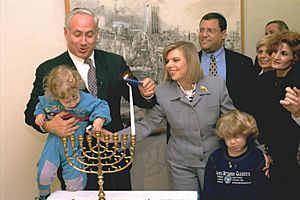
Netanyahu has been married three times. Netanyahu's first marriage was to Miriam Weizmann. The couple had one daughter, Noa (born 29 April 1978).
In 1981, Netanyahu married a non-Jewish British student named Fleur Cates. She later converted to Judaism. After moving with Netanyahu to Israel, Cates sued for divorce in 1988.
His third wife, Sara Ben-Artzi, was working as a flight attendant on an El Al flight from New York to Israel when they met. She was in the process of completing a master's degree in psychology. The couple married in 1991. They have two sons: Yair (born 26 July 1991), a former soldier in the IDF Spokesperson's Unit, and Avner (born 10 October 1994), a national Bible champion and winner of the National Bible Quiz for Youth in Kiryat Shmona and former soldier in the IDF Combat Intelligence Collection Corps.
See also
 In Spanish: Benjamín Netanyahu para niños
In Spanish: Benjamín Netanyahu para niños
- Forbes list of The World's Most Powerful People
- List of international prime ministerial trips made by Benjamin Netanyahu
- List of Israeli politicians
- List of Massachusetts Institute of Technology alumni
Images for kids
-
Netanyahu (right) with Sorin Hershko, a soldier wounded and permanently paralyzed in Operation Entebbe, 2 July 1986
-
Netanyahu's first meeting with Palestinian President Yasser Arafat at the Erez crossing, 4 September 1996
-
Netanyahu sitting with U.S. Secretary of State Madeleine Albright and Palestinian President Yasser Arafat at the Wye River Memorandum, 1998
-
Netanyahu in a meeting with President Dmitry Medvedev in Russia, 24 March 2011
-
Netanyahu, Hillary Clinton, George J. Mitchell and Mahmoud Abbas at the start of the direct talks, 2 September 2010
-
Netanyahu and US Secretary of State Mike Pompeo.
-
Netanyahu meets with President Donald Trump in Jerusalem, May 2017
-
President Trump, joined by Netanyahu behind, signs the proclamation recognizing Israel's 1981 annexation of the Golan Heights, March 2019
-
Israelis protest against Netanyahu outside his official residence in Jerusalem on 30 July 2020
-
Netanyahu publicly supported the Trump peace plan for the creation of a Palestinian state.
-
Standing with Israeli Minister of Defense Ehud Barak, Netanyahu holds an Iranian instruction manual for the anti-ship missile captured in Victoria Affair, March 2011
-
Netanyahu lighting Hanukkah candles on the first night in the prime minister's office in Jerusalem with his wife, Sara and their sons, Yair and Avner, 1996
-
Netanyahu with Russian President Vladimir Putin at the 2018 Moscow Victory Day Parade in Moscow
-
Netanyahu with Brazilian President Jair Bolsonaro in Jerusalem, 31 March 2019


